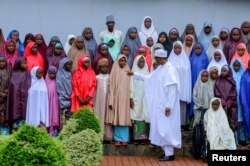Across Nigeria, people are praying for the return of Leah Sharibu. The 15-year-old was one of more than 100 schoolgirls who were abducted by a faction of the jihadist sect Boko Haram last month in the northeastern town of Dapchi.
On Wednesday, the militants released nearly all of the girls, except for five who died on the way to Dapchi — and Leah.
She was the sole Christian among the group, and her family believes that was the reason she was held back.
“They told her to convert to Muslim and she told them that she would not convert to Muslim,” Nathan Sharibu, Leah’s father, told VOA. “I don’t want my daughter to be converted to any religion than Christianity.”
The residents of Dapchi, whom are predominantly Muslim, have been visiting the Sharibu house and voicing support for the Sharibu family. Local Christians are doing the same. People in both groups are demanding the Nigerian government to do something to secure her release.
But some of those demands have taken an angry, political tone. The Christian Lawyers Fellowship of Nigeria accused the federal government of allowing Leah to remain in captivity “on account of her religious faith.”
Heightened tensions
Those types of comments have sparked concern that this week’s events could heighten tensions in a country that has seen periodic, deadly bouts of sectarian violence between Christians and Muslims or various ethnic groups.
“Sadly, this particular incident has basically twisted the knife of division in Nigeria a little more,” said Emmanuel Ogebe, a U.S.-based Nigerian lawyer and rights activist. “The terrorists just really ruined things by keeping Leah back. That wasn’t necessary.”
Boko Haram is divided into several factions, but two have emerged as the most prominent. The original group, led by Abubakar Shekau, is still believed to be the larger one. In 2015, Shekau pledged allegiance to the Islamic State militant organization. However, IS recognized Abu Musab al-Barnawi, the alleged son of Boko Haram founder Mohamed Yusuf, as the new leader of Boko Haram.
Al-Barnawi broke away from Shekau and his group is believed to be the relatively less violent one.
Moses Ochonu, a history professor at Vanderbilt University in Tennessee, has conducted extensive research on the Boko Haram insurgency. He says both factions want to trigger a war between Muslims and Christians, do away with the Nigerian government and set up an Islamic caliphate. Where they diverge, he says, is in tactics.
“(Al-)Barnawi has always been focused on winning the hearts and minds of people in the northeast,” Ochonu said. “The major issue of disagreement between the two camps has been that al-Barnawi accuses Shekau of alienating people in the northeast of Nigeria, alienating them with his indiscriminate killings and violence.”
Ochonu and others believe that al-Barnawi is conducting a public relations campaign to win support and distinguish his group from Shekau’s. His group is believed to avoid using Muslim girls to carry out suicide attacks, while Shekau’s sect has become notorious for doing so.
During the abduction of the Dapchi schoolgirls, reportedly carried out by al-Barnawi’s faction, no Dapchi residents were killed. Witnesses said the insurgents also told the schoolgirls they would not execute them.
The return of nearly all of the Dapchi girls was met with jubilation among the townspeople. VOA confirmed the source of a video published by the Premium Times newspaper, which showed young men in Dapchi clapping and smiling on the street in front of Boko Haram insurgents who are riding in their vehicles while waving their flag. The Dapchi residents are seen thanking the militants for returning their daughters as well as praying for them in the Hausa language.
Growing support for faction
The video has gone viral in Nigeria. Some worry it shows growing support for al-Barnawi’s faction. VOA spoke with the reporter who obtained the video.
“People are misinterpreting the video,” Mohammed Lere said. “They were celebrating the return of their children. That is it. Everybody who has his loved ones taken away will definitely celebrate his return. … They are saying thank you for our daughters, now go.”
Some analysts doubt that the local communities can distinguish between the Boko Haram factions and feel that al-Barnawi’s PR campaign may not be effective at the grassroots.
“Boko Haram is Boko Haram,” said Kyari Mohammed, a professor at a university in northeastern Nigeria’s Adamawa State. “Yes, it’s not unusual for one faction to present themselves as the more humane face of Boko Haram, but the main crux of the matter is that they are all terrorists and none of them can be said to be friendly to any community.”
However, he admits that he is concerned that the religious divide in Nigeria could get deeper.
The parents of the girls kidnapped in April 2014 from a school in the remote town of Chibok are still waiting for their daughters. The whereabouts of more than 100 of them are still unknown.
“I presume that the reason why the president didn’t [undertake] serious action concerning our daughters is because most of them are Christians,” says Enoch Mark, whose daughter is among the missing Chibok Girls. He is a Christian pastor.
In a statement, Nigerian President Muhammadu Buhari has vowed to rescue Leah Sharibu and said he is fully aware of his duty to protect all Nigerians irrespective of their religious affiliation.






